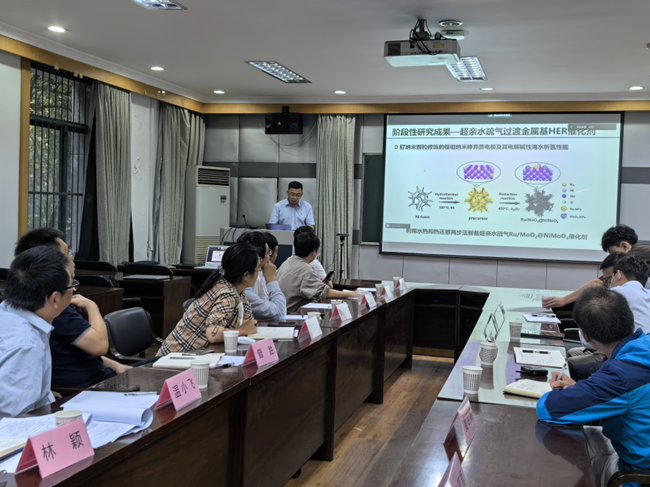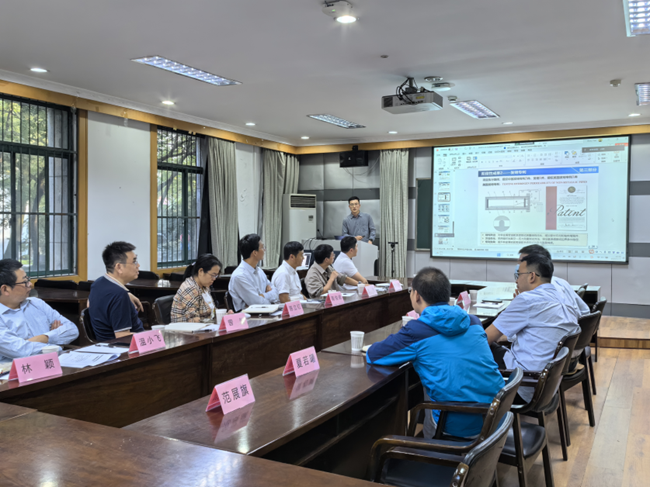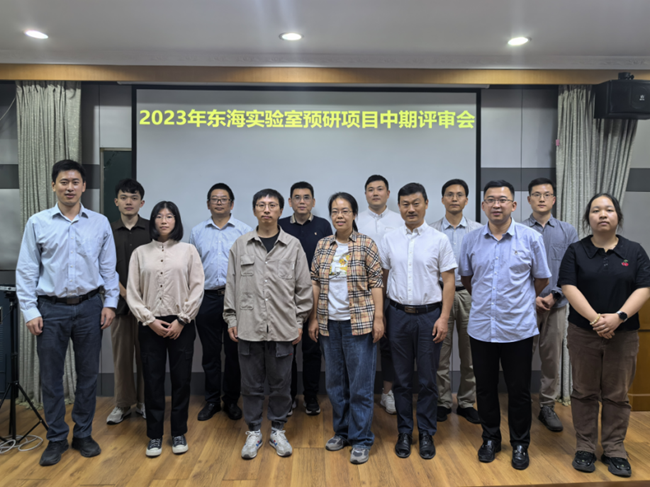On November 3, 2023, a mid-term assessment meeting for two preliminary research projects of Donghai Laboratory was held in Hangzhou: "High-Efficiency Wind-Powered Seawater Electrolysis for Hydrogen Production Systems" and "Development of Testing Methods and Equipment for Hydrogen Compatibility in Marine Non-Metallic Pipelines." The meeting convened a review panel comprising six experts from the National Intellectual Property Administration, Zhejiang Sci-Tech University, Zhejiang University of Technology, and Zhejiang Academy of Special Equipment Science. The panel assessed project progress and interim results and examined relevant materials and technical documents.
Electrocatalytic seawater splitting for hydrogen production is a vital solution for the energy crisis and sustainable hydrogen energy development. Presently, platinum-based materials, despite their high catalytic activity, are expensive and have limited availability, restricting their widespread use. Hence, there's an urgent need to develop new nickel-based transition metal electrocatalysts with unique microstructures and a high density of active sites, design prototype seawater electrolysis reactors, and enhance their efficiency in catalyzing seawater splitting for hydrogen production.
Pipeline transportation stands out as the most cost-effective and practical solution for large-scale, long-distance hydrogen transportation, making it a key focus in future hydrogen infrastructure development. Marine non-metallic hydrogen pipelines operate under demanding conditions, including complex loads and exposure to harsh environments while handling high-pressure hydrogen gas. The failure modes and damage mechanisms of these pipelines remain unclear, underscoring the critical need for the development of hydrogen compatibility testing equipment and assessment methods for non-metallic hydrogen pipeline materials.
The project team reported on the two preliminary research projects, covering aspects such as project overview, interim research progress, interim results, and future research plans.

Dr. Yang Hou reported on 'High-Efficiency Wind-Powered Seawater Electrolysis for Hydrogen Production Systems.'

Dr. Riwu Yao reported on ‘Development of Testing Methods and Equipment for Hydrogen Compatibility in Marine Non-Metallic Pipelines.’
The project team successfully developed large-scale synthesis techniques for advanced multi-level, super-hydrophilic, and gas-shedding transition metal-based catalysts and membrane electrodes for seawater electrolysis to produce hydrogen and oxygen. This achievement allowed for precise structural control of high-efficiency catalysts and their mass production, significantly enhancing the performance of seawater electrolysis for hydrogen production. Furthermore, a comprehensive mathematical model and technical plan for mass, heat, and electricity transfer within the electrolysis cell have been established, creating a complete set of crucial technologies for cost-effective, energy-efficient, and durable hydrogen production from seawater. Additionally, the project team conducted hydrogen permeability tests, analyzed hydrogen-induced damage, and developed testing equipment for non-metallic hydrogen transport pipelines. These efforts provided essential foundational data, modeling techniques, and testing equipment to support subsequent tests and the manufacturing of hydrogen permeability in non-metallic transport pipelines progress aligned with the project timeline. The review panel thoroughly assessed the progress, noting that the mid-term progress aligned with the project timeline. The team's research plan for the next phase was deemed reasonable, clear, and expected to be completed on schedule. The panel advised the team to summarize research efforts timely and strive for outstanding results.
In the upcoming phases, the project team will continue to develop theoretical analysis models and perform tests to investigate the active sites on the surface of catalytic materials, analyze the reaction kinetics of adsorbed water molecules, establish the relationship between material structure and catalytic performance, and elucidate the reaction mechanism for electrocatalytic seawater splitting in hydrogen production. In addition, the project team will explore the pressure resistance, hydrogen permeability, and failure modes induced by hydrogen in non-metallic materials used for marine hydrogen transport pipes. This effort will lead to the development of testing and evaluation methods for pressure resistance and hydrogen leakage performance in non-metallic hydrogen transport pipelines, ensuring the successful completion of both projects.

Participants in Hangzhou